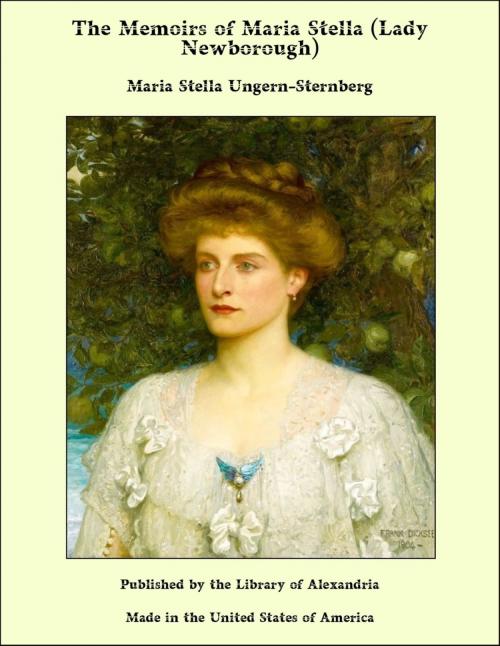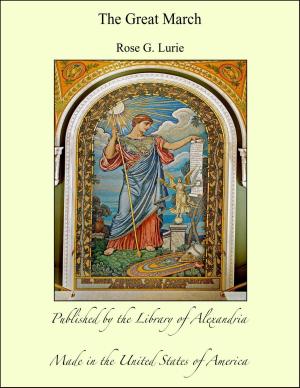The Memoirs of Maria Stella (Lady Newborough)
Nonfiction, Religion & Spirituality, New Age, History, Fiction & Literature| Author: | Maria Stella Ungern-Sternberg | ISBN: | 9781465618757 |
| Publisher: | Library of Alexandria | Publication: | March 8, 2015 |
| Imprint: | Language: | English |
| Author: | Maria Stella Ungern-Sternberg |
| ISBN: | 9781465618757 |
| Publisher: | Library of Alexandria |
| Publication: | March 8, 2015 |
| Imprint: | |
| Language: | English |
In the spring of 1902 I was rummaging amongst the Archives of the Vatican, of whose secular secrets Pope Leo XIII, of august memory, had made an end by opening them to the world of inquirers, with no fear that the dangerous resurrection of this Lazarus of history would be for that liberal Pontiff—as it was for the Divine Miracle-worker of Bethany—the prelude to the maledictions of a scandalized Sanhedrin, and to another painful Passion—a renewal of that of old. While waiting for the crucifigation of the Pharisees—those lovers of darkness and the unfathomable crimes of secret history—I took pleasure, as a simple Publican and lover of the light, in admiring the daylight making its cheerful way under the corniced vaults of the Archivio Segreto, and disclosing those files of dusty manuscripts, which, each stripping off his registered shirt, emerge naked from the tomb at the call of the first passer-by who, recognizing his dead, simply says, “Come forth!” and they come. Standing before those desks over those deep tomblike cases of archives wherein slumber the secrets of the dead, my ears open to the miraculous, “Lazarus, come forth!” which the patient seekers for silent memories are prepared to utter at the turning of each yellow leaf, I let my dreaming eye, that afternoon, rest upon a ray of that Roman sunshine, as, with its soft radiance, it gave life to the solitude of a vault, scattering its riches broadcast through the windows, prodigal as the gambler staking with both hands just for the pleasure of playing, and losing. “I’ve been using in your service the time you waste here!” said a searcher in this Vatican vault, as he came and sat down at my work-table. He is one who knows all the treasures of the place, since he has frequented it for over thirty years, working for the most learned of the best Reviews—the Civilta Cattolica, to which my honourable colleague is one of the most authoritative contributors.… “Well, what do they say in Paris about Louis-Philippe?”
In the spring of 1902 I was rummaging amongst the Archives of the Vatican, of whose secular secrets Pope Leo XIII, of august memory, had made an end by opening them to the world of inquirers, with no fear that the dangerous resurrection of this Lazarus of history would be for that liberal Pontiff—as it was for the Divine Miracle-worker of Bethany—the prelude to the maledictions of a scandalized Sanhedrin, and to another painful Passion—a renewal of that of old. While waiting for the crucifigation of the Pharisees—those lovers of darkness and the unfathomable crimes of secret history—I took pleasure, as a simple Publican and lover of the light, in admiring the daylight making its cheerful way under the corniced vaults of the Archivio Segreto, and disclosing those files of dusty manuscripts, which, each stripping off his registered shirt, emerge naked from the tomb at the call of the first passer-by who, recognizing his dead, simply says, “Come forth!” and they come. Standing before those desks over those deep tomblike cases of archives wherein slumber the secrets of the dead, my ears open to the miraculous, “Lazarus, come forth!” which the patient seekers for silent memories are prepared to utter at the turning of each yellow leaf, I let my dreaming eye, that afternoon, rest upon a ray of that Roman sunshine, as, with its soft radiance, it gave life to the solitude of a vault, scattering its riches broadcast through the windows, prodigal as the gambler staking with both hands just for the pleasure of playing, and losing. “I’ve been using in your service the time you waste here!” said a searcher in this Vatican vault, as he came and sat down at my work-table. He is one who knows all the treasures of the place, since he has frequented it for over thirty years, working for the most learned of the best Reviews—the Civilta Cattolica, to which my honourable colleague is one of the most authoritative contributors.… “Well, what do they say in Paris about Louis-Philippe?”















